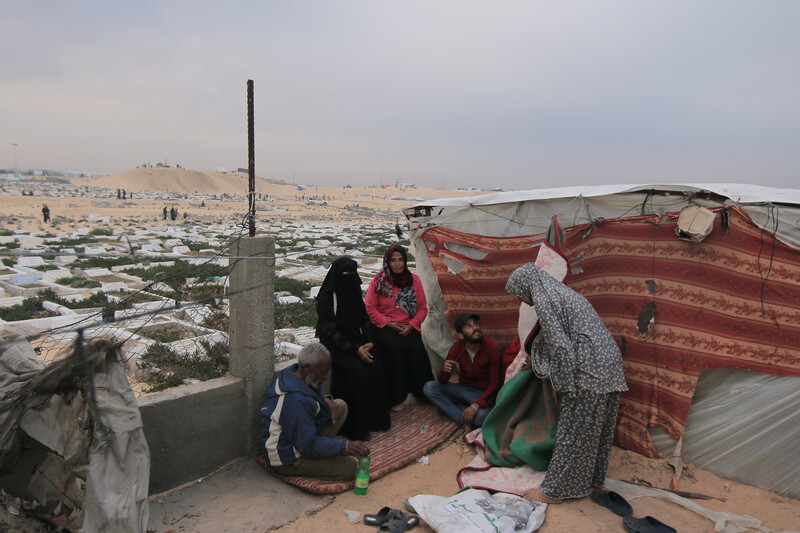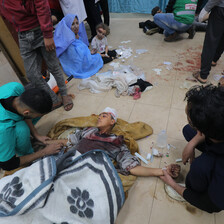The Electronic Intifada 18 February 2024

Gaza’s women have been forced to live in unhealthy conditions.
APA imagesWomen in Gaza find themselves on the frontline in a battle for survival. Devoid of shelter, safety, food, water and sanitation, they bear the brunt of a genocidal war.
Around 70 percent of all the people that Israel has killed in Gaza are women and children.
Around 1 million women and girls are displaced. For months, they have been living in a tent or in schools.
Every woman in Gaza is weary and at constant risk.
On average, two mothers are killed per hour.
Such a chilling statistic reflects a very dire reality. What does the future hold for womanhood, motherhood, childhood?
Behind the statistics, there are individuals and families.
The responsibilities shouldered by these women, who are the main pillars of their families, have become even more challenging. More than 3,000 women have become widows and are new heads of households.
They have to take care of and protect their children in inhumane environments.
They strive to prepare scarce food on wood fires for their families in the early hours of the morning. They lack the very basic needs for their own wellbeing, most importantly sanitary needs and privacy.
No sanitary care
Dr. Areej Hijazi, an obstetrician, experiences the everyday struggles of Gaza women during this genocidal war.
“Women are in very bad conditions these days,” she said. “The lack of water and proper hygiene significantly impact their health. Sanitary pads are strikingly expensive and sometimes cannot be found.”
“Women who have recently given birth and those experiencing irregular or heavy periods are forced now to use pieces of cloth that they must wash and reuse,” she added. “This carries the risks of bacterial and fungal infections, exacerbating their situation.”
Privacy becomes a distant memory in the cramped tents and schools.
The United Nations Sustainable Development Goals (SDGs) include universal access to adequate sanitation and hygiene. That seems like a very remote dream during this humanitarian crisis.
In 2024, women in Gaza plead for the most basic sanitary care – sanitary pads. They are struggling to survive in a world that seems to have forgotten them.
The dire situation escalates for the tens of thousands of pregnant and lactating women who lack access to sufficient care both before and after giving birth.
The critical lack of antenatal care is compounded by the absence of iron supplements.
The scarcity of medical treatment has especially adverse consequences for pregnant women with health issues such as diabetes or high blood pressure.
Antenatal care “is essentially unavailable, except for some scattered field points providing very basic services,” Areej Hijazi pointed out.
“Unfortunately, these services do not reach all areas and not all women know about them. And even if women are aware of them, finding transportation to access them becomes a formidable challenge.”
Shortage of midwives
Around 180 women give birth per day in Gaza.
The stories of women giving birth in school corridors and tents, without access to hospitals or transportation, are a desperate cry for help.
The lack of basic necessities coupled with constant exposure to traumatic scenes has an immeasurable impact on the physical and mental health of these women.
Al-Helal al-Emirati hospital in Rafah – Gaza’s southernmost city – is the only refuge for women.
The challenges its staff face are overwhelming: a shortage of towels, sutures, medicine and other supplies.
The situation is getting worse, with the amount of aid allowed completely inadequate. Matters will not improve without a ceasefire.
Each day, approximately 80 women give birth through vaginal deliveries at al-Emirati hospital. A further 20 deliveries are made via cesarean sections.
Al-Emirati is the smallest maternity hospital in Gaza. Before 7 October, it was only receiving 10-15 women in labor per day.
Having to deal with a huge increase in patients places immense strain on the hospital’s staff and on an already stretched healthcare system.
Al-Emirati hospital has a shortage of midwives and the responsibilities faced by those midwives working there are overwhelming.
Within a few hours of giving birth, women have to be discharged. They go back to tents or overcrowded schools.
New mothers are “deprived of crucial care and postpartum education, breastfeeding and hygiene,” Areej Hijazi, who works at al-Emirati hospital, noted.
“Complications have surged,” she added.
There have been increases in preterm labor, miscarriages, hemorrhaging, sepsis and postnatal depression.
The consequences will affect a whole generation. Children will be less healthy and a rise in chronic diseases is expected.
Life expectancy will be shorter and there are bound to be delays in the development of many children.
Heartbreaking
Hijazi has encountered heartbreaking cases of pregnant women who have undergone amputations after being injured by Israel’s relentless violence. Those women have faced immense struggles during childbirth.
There have been a huge number of other cases in which pregnant women were greatly traumatized after surviving Israel’s bombardments. The unfortunate outcomes in such cases have often been the loss of newborns.
Sometimes, hysterectomies had to be performed. As a result those women – frequently quite young – will have no chance of conceiving in the future.
In one case, a woman had become pregnant through in-vitro fertilization – after trying to conceive for 15 years.
She gave birth to quadruplets – three boys and a girl.
This woman and her children were killed during the current war, leaving her husband to mourn alone.
Another woman who became pregnant through IVF gave birth prematurely amid the horrors of bombardment and displacement. Her twin daughters were placed in an incubator but did not survive.
A disturbing pattern can be discerned. Israel is systematically abusing the reproductive rights of Gaza’s women.
These abuses have occurred at a time when there has been little international attention paid to the kidnapping and detention of women and children by Israeli troops invading Gaza. Evidence that these women have been tortured has been gathered by human rights groups.
Israel has fabricated stories of mass rapes on 7 October as a pretext for its genocidal attack on Gaza.
As well as amplifying Israel’s lies, the West’s governments have been complicit in Israel’s assaults on Gaza’s women.
The hypocrisy of the US has been especially stark.
Joe Biden – who promised to make gender equity a cornerstone of his presidency – is a chief enabler of Israel’s war. The fake feminists in his administration are abetting the violations of reproductive rights in Gaza.
Sewar Elejla was formerly a doctor at al-Shifa hospital in Gaza. She is now a Canada-based researcher.





